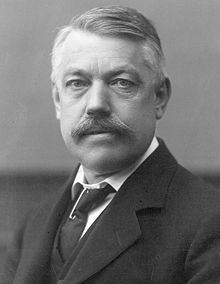- Christian Bohr
-
Christian Bohr 
Born Christian Harald Lauritz Peter Emil Bohr[1]
February 14, 1855
CopenhagenDied February 3, 1911 (aged 55)
CopenhagenEducation Medical degree, Doctorate in physiology Occupation Professor at University of Copenhagen Known for Physiology research Home town Copenhagen Children Jenny Bohr (1883–1933)[2]
Niels Bohr (1885–1962)
Harald Bohr (1887–1951)Parents Henrik Georg Christian Bohr, Caroline Agusta Lovise Rienestad Christian Harald Lauritz Peter Emil Bohr (1855–1911, both in Copenhagen) was a Danish physician, father of the physicist and Nobel laureate Niels Bohr, as well as the mathematician Harald Bohr and grandfather of another physicist and nobel laureate Aage Bohr. He married Ellen Adler in 1881.
Personal life
He wrote his first scientific paper, "Om salicylsyrens indflydelse på kødfordøjelsen" ("On salicylic acid's influence on the digestion of meat"), at the age of 22. He received his medical degree in 1880, studied under Carl Ludwig at University of Leipzig, took a Ph.D. in physiology and was appointed professor of physiology at the University of Copenhagen in 1886.[3]
Christian Bohr is buried in the Assistens Kirkegård.
Physiology
In 1891, he was the first to characterize dead space.[4][5]
In 1903, Christian Bohr described the phenomenon, now called the Bohr effect, whereby hydrogen ions and carbon dioxide heterotopically decrease hemoglobin's oxygen-binding affinity. This regulation increases the efficiency of oxygen release by hemoglobin in tissues, like active muscle tissue, where rapid metabolization has produced relatively high concentrations of hydrogen ions and carbon dioxide.
References
- ^ Irzhak, L. I. (May 2005). "Christian Bohr (On the Occasion of the 150th Anniversary of His Birth)" (PDF). Human Physiology (MAIK Nauka/Interperiodica distributed exclusively by Springer Science+Business Media LLC) 31 (3): 366–368. doi:10.1007/s10747-005-0060-x. http://www.springerlink.com/content/l982pr8225325581/fulltext.pdf. Retrieved 2008-05-22.
- ^ "Niels Bohr". Assistens Cemetery in Copenhagen. http://www.zboray.com/graves/Copenhagen/bohr.htm. Retrieved 2008-05-22.
- ^ Rhodes, Richard (1986). The Making of the Atomic Bomb. New York: Simon & Schuster. ISBN 0-671-44133-7.
- ^ Bohr C. Ueber die lungenathmung. Skand Arch Physiol 2: 236–268, 1891.
- ^ Klocke R (2006). "Dead space: simplicity to complexity.". J Appl Physiol 100 (1): 1–2. doi:10.1152/classicessays.00037.2005. PMID 16357075. article
- Fredericia, L.S. (1932) Christian Bohr, pp. 173–176 in: Meisen, V. Prominent Danish Scientists through the Ages. University Library of Copenhagen 450th Anniversary. Levin & Munksgaard, Copenhagen.
Categories:- 1855 births
- 1911 deaths
- Danish scientists
- Danish physiologists
- University of Copenhagen faculty
- Science teachers
- People from Copenhagen
- Niels Bohr
Wikimedia Foundation. 2010.
